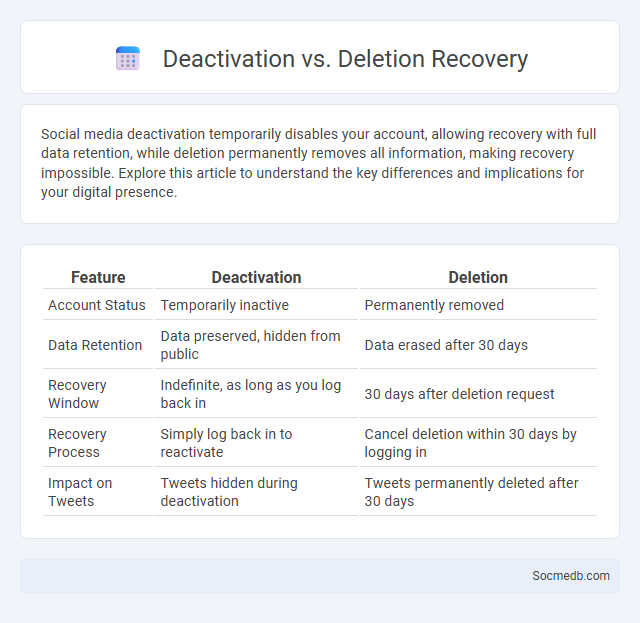
Photo illustration: Deactivation vs Deletion Recovery
Social media deactivation temporarily disables your account, allowing recovery with full data retention, while deletion permanently removes all information, making recovery impossible. Explore this article to understand the key differences and implications for your digital presence.
Table of Comparison
| Feature | Deactivation | Deletion |
|---|---|---|
| Account Status | Temporarily inactive | Permanently removed |
| Data Retention | Data preserved, hidden from public | Data erased after 30 days |
| Recovery Window | Indefinite, as long as you log back in | 30 days after deletion request |
| Recovery Process | Simply log back in to reactivate | Cancel deletion within 30 days by logging in |
| Impact on Tweets | Tweets hidden during deactivation | Tweets permanently deleted after 30 days |
Understanding Deactivation vs Deletion
Deactivation temporarily disables a social media account, allowing users to reactivate and recover content later, while deletion permanently removes all data and cannot be reversed. Understanding the distinction is crucial for managing online presence and privacy effectively. Social platforms like Facebook and Instagram offer both options to accommodate varying user needs and concerns.
What Happens During Account Deactivation
When a social media account is deactivated, the user's profile, posts, and activity become temporarily invisible to other users while the data remains stored on the platform's servers. Account deactivation typically pauses all notifications and messaging functions, preventing new interactions until reactivation occurs. This temporary suspension helps protect user information without permanently deleting content or connections.
Permanent Effects of Account Deletion
Deleting your social media account results in permanent loss of all photos, messages, and personal data linked to that profile, making recovery impossible. Your digital footprint significantly shrinks, affecting online visibility and connections with friends or followers. This irreversible action also ensures removal from advertising algorithms, impacting targeted marketing based on your previous activity.
Can You Recover a Deactivated Account?
Recovering a deactivated social media account is often possible by logging back in within the platform's specified reactivation period, which commonly ranges from 14 to 30 days. Your ability to restore account content and connections depends on the platform's policies and the length of deactivation. Prompt action increases the chances of successful recovery before permanent deletion occurs.
Is Recovery Possible After Account Deletion?
Recovery after social media account deletion depends on the platform's policies and the duration since deletion. Some platforms offer a grace period where you can restore your account by logging back in, while others permanently erase all data immediately upon deletion. To maximize your chances of recovery, you should act quickly and contact support if needed, ensuring your data and connections remain intact.
Key Differences: Deactivation Recovery vs Deletion Recovery
Deactivation recovery allows You to temporarily disable your social media account, preserving all data and enabling easy reactivation with full profile restoration. Deletion recovery involves permanently removing your account and associated data, making recovery impossible once the deletion process is complete. Choosing deactivation offers flexibility for short-term breaks, while deletion is irreversible and suited for permanent account closure.
Timeline: How Long Do You Have to Recover Accounts?
Account recovery timelines on social media platforms vary significantly, typically ranging from a few hours to several weeks depending on the platform's security protocols and verification processes. Platforms like Facebook and Instagram offer recovery windows usually spanning 30 days before permanently deleting account data, allowing users to regain access by verifying identity or resetting passwords. Prompt action during this period is critical to ensure successful account restoration and prevent data loss or unauthorized access.
Risks and Benefits of Deactivation vs Deletion
Deactivating social media accounts allows users to temporarily disconnect while preserving data, offering an easy option to resume activity without losing content, whereas deletion permanently removes all data, ensuring privacy but eliminating the possibility of recovery. The benefits of deactivation include reduced exposure to online risks such as cyberbullying and distraction, while maintaining social connections; deletion maximizes privacy protection and reduces digital footprint but can hinder re-engagement and data retrieval. Risks of deactivation include ongoing data retention by platforms that may be vulnerable to breaches, while deletion risks irreversible loss of important memories, contacts, and personal information.
User Data: What Is Retained and What is Lost?
Social media platforms retain vast amounts of user data, including personal information, browsing history, interactions, and location details, which are leveraged for targeted advertising and content personalization. However, not all user data is permanently stored; ephemeral content like stories and direct messages may be deleted after a set time, and users can also remove or anonymize certain information. Despite these limitations, concerns about data loss arise from accidental deletions, platform breaches, and policy changes that can affect data availability and user privacy.
Making the Right Choice: Deactivation, Deletion, or Recovery
Choosing between deactivation, deletion, or recovery of social media accounts hinges on user intent and privacy needs. Deactivation temporarily hides profiles and content, allowing users to return without data loss, while deletion permanently removes all data, eliminating any digital footprint. Recovery options vary by platform but generally allow account restoration within specific timeframes, emphasizing the importance of understanding platform-specific policies to make informed decisions.
 socmedb.com
socmedb.com